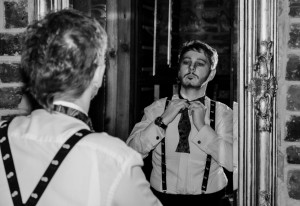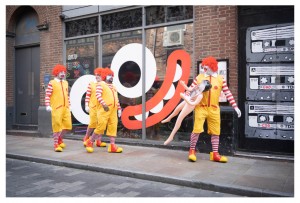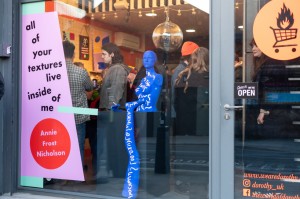“Short Supply has really gained traction” – Prospering Post-Graduation
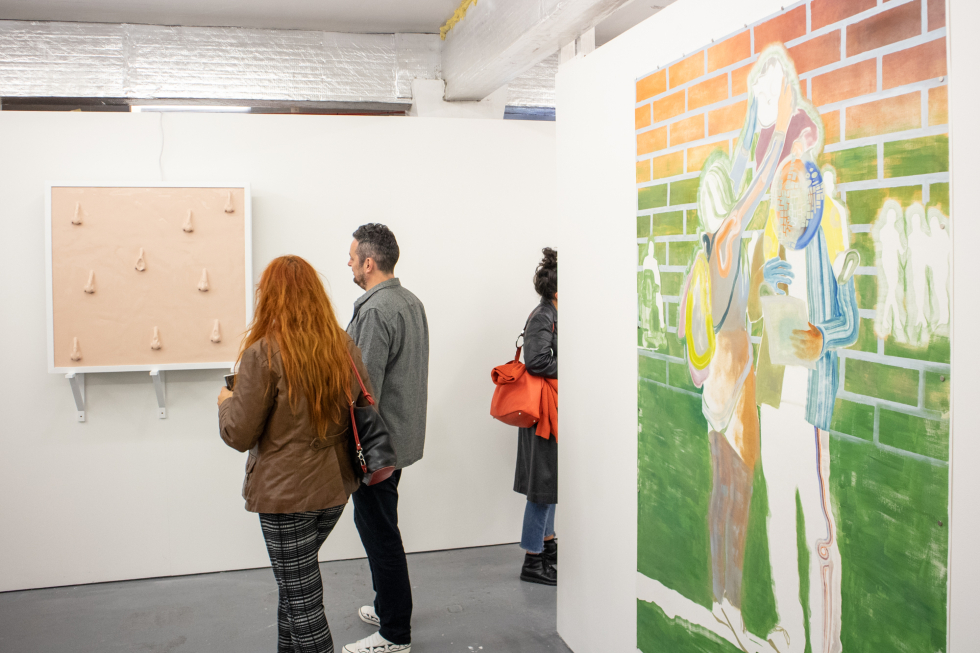
The period immediately after graduation can be bewildering. Outside of the university bubble, the question for many is “What next?” Short Supply – AKA Mollie Balshaw and Rebekah Beasley – has you covered…
The Double Negative: How and why did Short Supply come about?
Short Supply: We started directing Short Supply in our final year of university. This period is always a bit of a haze for any graduating student trying to coordinate and organise themselves for the ‘real world’. We had, very quickly, worked out that if we wanted to coordinate any projects ourselves and maintain some momentum in the creative industries, we needed some sort of reputation in and around the local art scene and the community, and that was going to take some work. We also knew once we left university, we would be losing out on some crucial resources (such as our current support network) and opportunities (which outside of university frequently fail to strike the balance between quality and accessibility) that we wanted to continue to have access to, and so we were pre-empting the situation and navigating that accordingly.
This is where it occurred to us that there must be hundreds of students, just graduating, feeling exactly how we were feeling; and we wanted to establish a project that would allow us to offer support and guidance from a more down to earth and understanding perspective. The people we wanted to support were going through what we were going through, and we wanted to be the change we wanted to see. Short Supply now hosts multiple exhibitions and events each year that encourage and offer opportunities for early career artists, predominantly within the North and North West, but now branching out across the UK and internationally too.
What have you learned in your first-year post-graduation?
We have discovered that what you learn in university is only a fraction of what you need to know when you graduate but, personally, we believe that university teaches you all it realistically can; so much of your education comes from the act of doing. Over time, you definitely ease into this new way of working – it can just be jarring at first, particularly if your university hasn’t taken the proper steps to prepare you for it.
We have done a handful of talks now at universities and live events and the main thing we tell people is “doing something is better than doing nothing” and “don’t take what we say as gospel… we are still learning ourselves” which is really important for us to remember too. We are still very new to how this world operates, we haven’t done everything perfectly in our short time doing this and we don’t think anybody who has supported us expects that. In the art world you can be made to feel like one-year counts for ten, and six months of inactivity can feel like a lifetime. There’s a very short window where you’re ‘permitted’ to have shown your chops before you’re left behind, but learning never stops and we have tried really hard not to take this standard personally.
How has the project developed?
We feel like we’ve taken massive strides this year despite the turbulent circumstances, and actually, there are a lot of positives to be derived from the situation for the artist-led we think. Short Supply as a project has really gained traction, and that’s a great thing for us because we know we’re offering something that is continuing to be valuable for others when it’s really needed.
For example, in the absence of physical space for a new project we were debuting right as lockdown came about called Supply Sessions (our response to a group critique format) we switched up the delivery and decided to run Skype Sessions remotely instead. These ended up being extremely popular, and we’ve had some of the best feedback from them we’ve had for any of our projects so far. Artists wanted and needed to keep having conversations and we identified with that, so we adapted our original plan in a way that meant we could help more people from anywhere in the world, and we think in a roundabout sort of way it’s been more successful for us having done that than it would have been originally just being restricted to the audience who could make it for a physical session each month.
We’ve also ploughed forward with our programmed exhibitions, again just adapting them to suit the current circumstances. Fortunately, our LGBTQIA+ showcase (supported by Superbia and Manchester Pride), Queer Contemporaries, will still go ahead as a physical exhibition which is really exciting – it’s one of the first shows to debut post lockdown and one of the only big group shows still able to go ahead this summer. This is of course a big responsibility and a lot of pressure as we have no real idea of how it will be received when we do eventually get audiences through the space, but generally we’re feeling optimistic – we think people will have missed art. Manchester Pride’s cancellation on top of all of this adds another layer of responsibility; representation and celebration in person has fallen [due to the circumstances], and we want to do everyone proud.
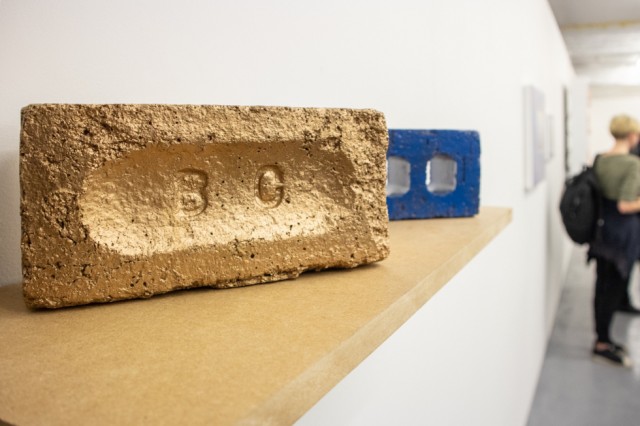
Have objectives shifted since Short Supply’s inauguration?
Our focus this year has continued to be platforming early career artists and creating opportunities for mentorship and collaboration across the region, but we’ve found ourselves reaching out further and receiving a response to the project internationally, and that potential is really exciting. Operating projects with heavy emphasis on digital presentation has that huge advantage, although we have a continued interest in how we can develop and improve the quality of physical experiences for new audiences too, within and outside of the landscape Covid-19 has created. We’re trying to see this as an opportunity for innovation rather than a setback – how have we been doing things and was that way even the most effective when we didn’t all have to stay away from each other? At the end of the day the objective remains the same: maintain that momentum and keep doing something, even if it’s not perfect. Grow, adapt and embrace uncertainty.
Tell us about the 2020 MADE IT Exhibition – is it going to take place online?
Initially, MADE IT 2020 was going to be a physical show hosted in one of the artist-led spaces in Manchester – but because of COVID-19 we have found ourselves space-less! It’s been really hard to pin down another location as understandably safety is ours and the community’s number one priority, but we didn’t want this year’s graduates to go without, so for now, we are planning on having the show take place digitally on our website. Fortunately, we’re still able to offer the same awards for this year’s showcase, so that’s one thing which hasn’t changed and we’re grateful for!
Visitors will be able to interact with the space remotely, access the works and information about the artists, and join us for a meet up over Zoom right after the show’s launch to chat with artists and emulate what would have been our private view! Bring your own beer / gin and tonic of course.
2020’s been particularly tough for new visual arts graduates, given the cancellation/postponement of degree shows. It seems to put even greater emphasis on the ability of those leaving uni to be self-starting.
Yes 100%. It’s been an especially difficult few months, and we have definitely been able to sympathise with the students who haven’t been able to showcase all their hard work to the fullest extent. Putting together your degree show is easily one of the most anxiety-riddled tasks in a student’s time studying, but it’s a rite of passage in a way and provides a bit of closure for this chapter of your life coming to an end, and to have it all of a sudden cancelled must be crushing. Cancellation of graduation ceremonies is even more devastating.
A lot of our friends who are / were still in university are finding this time particularly difficult because they feel as though they don’t have the support network they would have if they were still on campus, yet the workload remains the same. We hope that people will be able to reach out when they need help. This is why we wanted to set up our Supply Sessions – the name aptly changed to Skype Sessions when lockdown started – so that we may help support these students and early career artists find their feet through all the fog.
Despite the complications, we believe some amazing projects will surface in response to the situation. It gives us time to re-evaluate the degree show as a model – are they still relevant? are they still necessary? or are they more of a tradition than anything else that we’re merely upholding each year rather than significantly benefitting from. Maybe the system needed to be broken in such a stark way for us to see clearly what the point of the degree shows is in the first place. Perhaps the system could do with an upgrade…
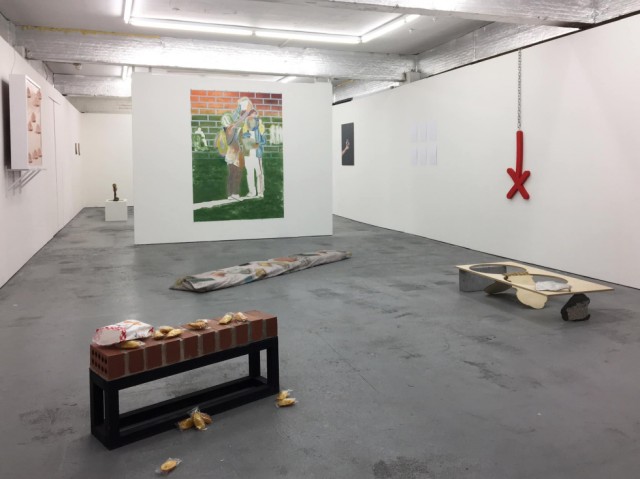
Covid-19 seems to have put paid to many an opportunity, but also forced people to be more creative – what’s your take?
We’ve definitely had to make amendments to the way we deliver projects, and the way we devise them too. There are some really colossal downsides to the spanner in the works that is Covid-19. Funding has been made harder than ever to access, physical spaces which were already in jeopardy now have even more pressure on them to try and remain open. In lockdown, artists found themselves with more time than any of us are used to having, but the transition back into work has been made exponentially harder and redundancy is a very serious reality for many working in retail and hospitality among other sectors. Those working freelance are facing equal difficulty.
Despite this, we have to see the potential that can grow from the cards we’ve been dealt. Digital spaces are thriving and the accessibility of them has allowed artists to connect and collaborate on a massive scale. We’ve been able to work and communicate with artists around the globe in ways we never expected in our first year of activity. It’s quite astonishing how encouraging it is to see people stand up for one another and work together to make an art world that is available for everyone to be a part of. That’s the very reason we started Short Supply in the first place. Every single one of us needs to make that effort to be generous with their time and resources, to boost those up who need it and work for a better tomorrow. It sounds cheesy, but that’s the situation we face.
Lockdown seems to have inspired the foregrounding of different discourses – has it given you the time/space to reflect or focus on things?
Lockdown has been difficult for us all in many different ways, but one positive to come out of it is that it has given us the chance for reflection and a new perspective on artist-led practice, the necessity of physical space and our trajectory going forward. Remote opportunities could be the way forward, and rather than seeing them as a restriction, we think there’s a real chance here to develop a previously relatively unexplored terrain that’s been available to us the whole time.
As told to Mike Pinnington
All images from MADE IT 2019, at Paradise Works
Further Reading: Introducing: Short Supply
LGBTQIA+ showcase Queer Contemporaries opens today
Apply to be part of graduate showcase, MADE IT 2020



